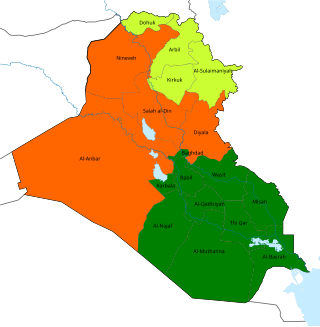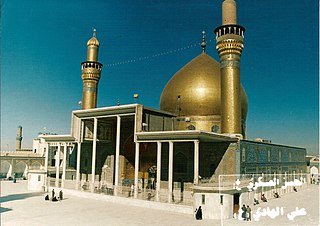Related Research Articles

Muqtada al-Sadr is an Iraqi Shia Muslim cleric, politician and militia leader. He is the leader of the Sadrist Movement and the leader of the Peace Companies, a successor to the militia he had previously led during the American military presence in Iraq, the Mahdi Army. In 2018, he joined his Sadrist political party to the Saairun alliance, which won the highest number of seats in the 2018 and 2021 Iraqi parliamentary elections.
Sectarianism is a political, cultural, or religious conflict between two groups. Prejudice, discrimination, exclusion, or hatred can arise in these conflicts, depending on the political status quo and if one group holds more power within the government. Often, not all members of these groups are engaged in the conflict. But as tensions rise, political solutions require the participation of more people from either side within the country or polity where the conflict is happening. Common examples of these divisions are denominations of a religion, ethnic identity, class, or region for citizens of a state and factions of a political movement.

Ali al-Husayni al-Sistani, is a Twelver Shia Iranian–Iraqi Grand Ayatollah and marja'. One of the most senior scholars in Shia Islam, he has been described as the spiritual leader of Shia Muslims worldwide, "the undisputed leader of Iraq's Shias", included in top positions of "The Muslim 500: The World's Most Influential Muslims", from 2009 to 2023, and named one of the 100 most influential people in the world by Time magazine in 2004 and 2005.

The National Iraqi Alliance, also known as the Watani List, is an Iraqi electoral coalition that contested the 2010 Iraqi legislative election. The Alliance is mainly composed of Shi'a Islamist parties. The alliance was created by the Supreme Council for Islamic Revolution in Iraq to contest in the January 2005 and December 2005 under the name United Iraqi Alliance, when it included all Iraq's major Shi'a parties. The United Iraqi Alliance won both those of elections however later fell apart after several major parties left the alliance due to disputes with Prime Minister Nouri al-Maliki and the Supreme Council.

Parliamentary elections were held in Iraq on 15 December 2005, following the approval of a new constitution in a referendum of 15 October.

The 2006 al-Askari Shrine bombing occurred on 22 February 2006 at approximately 6:44 a.m. local Iraqi time, and targeted the al-Askari Shrine in the city of Samarra, Iraq. The attack on the mosque, one of the holiest sites in Shia Islam, has not been claimed by any group; the then President of the United States, George W. Bush, claimed that the bombing was an al-Qaeda plot. Although the mosque was severely damaged from the blast, there were no casualties.

Nouri Kamil Muhammad-Hasan al-Maliki, also known as Jawad al-Maliki, is an Iraqi politician. Leading the Islamic Dawa Party since 2007, he served as Iraqi prime minister from 2006 to 2014 and as Iraqi vice president from 2014 to 2015 and again from 2016 to 2018.

International Islamic Fiqh Academy is an international Islamic institution for the advanced study of Islamic jurisprudence and law based in Jeddah, Saudi Arabia. It was founded following a resolution by the Third Islamic Summit Conference of the Organization of Islamic Cooperation, held in Mecca, that called for the establishment of an Islamic Fiqh Academy. The International Islamic Fiqh Academy was established in June 1983 as a subsidiary organ of the Organization of Islamic Cooperation. It consists of 57 member states and representatives.
Ibn Jibrīn or Abdullah ibn Abdulrahman ibn Jebreen was a Saudi Arabian right wing politician. He was a member of the Council of Senior Scholars and Permanent Committee for Islamic Research and Issuing Fatwas in Saudi Arabia.
After the death of Muhammad in 632, a group of Muslims, who would come to be known as the Sunnis, believed that Muhammad's successor as caliph of the Islamic community should be Abu Bakr, whereas a second group of Muslims, who would come to be known as the Shias, believed that his successor should have been Ali. This dispute spread across various parts of the Muslim world, which eventually led to the Battle of Jamal and Battle of Siffin. Sectarianism based on this historic dispute intensified greatly after the Battle of Karbala, in which Husayn ibn Ali and some of his close partisans, including members and children of the household of prophet, were killed by the ruling Umayyad Caliph Yazid I, and the outcry for revenge divided the early Islamic community, albeit disproportionately, into two groups, the Sunni and the Shia. This is known today as the Islamic schism.
Sheikh Jalal al-Din Ali al-Sagheer is an Iraqi politician and a former member of parliament in the Islamic Supreme Council of Iraq. Prior to the 2003 US-led Invasion of Iraq he was the chairman of the Paris Mosque in France. He is the imam of the Shi'a Buratha Mosque in Baghdad.
The Saudi government does not conduct a census on religion or ethnicity, but some sources estimate the Shia population in Saudi Arabia to make up around 20% of the approximately 34 million natives of Saudi Arabia.

Sheikh Yasser al-Habib is a Kuwaiti Twelver Shia scholar, and the head of the London-based Khoddam Al-Mahdi Organization, as well as Al-Muhassin mosque in Fulmer, Buckinghamshire, and the writer of The Lady of Heaven. al-Habib's work focuses on Islamic history, drawing on Shia and Sunni sources.
This article concerns the formation process of the Al Maliki I Government of Iraq in the aftermath of the Iraq National Assembly being elected on December 15, 2005. Due to disputes over alleged vote-rigging the results of the election were only certified by the Independent Electoral Commission of Iraq on February 10, 2006.

Muhammad bin Abdul Karim Issa is a Saudi Arabian religious leader, Secretary General of the Muslim World League, President of the International Islamic Halal Organization, and former Saudi Minister of Justice.

Anti-Sunnism is hatred of, prejudice against, discrimination against, persecution of, and violence against Sunni Muslims.

The Popular Mobilization Forces, also known as the People's Mobilization Committee (PMC) and the Popular Mobilization Units (PMU), is an Iraqi state-sponsored umbrella organization composed of approximately 67 different armed factions, with around 230,000 fighters that are mostly Shia Muslim groups, but also include Sunni Muslim, Christian, and Yazidi groups. The Popular Mobilization Units as a group was formed in 2014 and have fought in nearly every major battle against ISIL. Many of its main militias, in particular the Shias, trace their origins to the "Special Groups", Iranian-sponsored shiite groups which previously fought an insurgency against the United States and the Coalition forces, as well as a sectarian conflict against Ba'athist and sunni jihadi insurgents. It has been called the new Iraqi Republican Guard after it was fully reorganized in early 2018 by its then–Commander in Chief Haider al-Abadi, Prime Minister of Iraq from 2014 to 2018, who issued "regulations to adapt the situation of the Popular Mobilization fighters".

The Najaf Seminary, also known as the al-Hawza Al-Ilmiyya, is the oldest and one of the most important Shia seminaries (hawza) in the world. It is located near the Imam Ali Mosque in the city of Najaf in Iraq, and also operates a campus in Karbala, Iraq. It was established by Shaykh al-Tusi, and continued as a center of study after the establishment of modern Iraq in 1921.
The Shiite Endowment Office is an Iraqi administration created by the Iraqi Governing Council after the fall of Saddam Hussein in 2003. It was created from the dissolution of the Ministry of Awqaf and religious Affairs in former Baath rule, separating from it the Holy Shrines, the mosques, the hawzas and all religious endowments of Shia Islam in Iraq.

Mahdi ibn Ahmed Al-Sumaidaie is the Grand Mufti of Iraq. He runs the Sunni Fatwa Council in Baghdad, at the Umm-al-Tubul mosque.
References
- ↑ "Makkah Al-Mukarramah declaration on the Iraqi situation ("Mecca Document") - Iraq | ReliefWeb". reliefweb.int. Retrieved 8 June 2022.
- ↑ News, Arab (4 August 2021). "Historic Forum Brings Together Iraqi Scholars In Makkah". Eurasia Review. Retrieved 8 June 2022.
{{cite web}}:|last=has generic name (help)